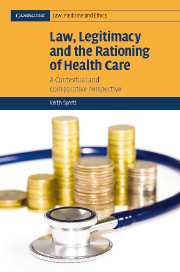Book contents
- Frontmatter
- Contents
- Table of Cases
- Acknowledgements
- 1 Introduction
- 2 Why ‘Ration’ Healthcare Resources?
- 3 How Rationing Takes Place
- 4 Rationing and the Problem of Legitimacy
- 5 Rationing and the Courts: Theoretical Perspectives
- 6 Rationing in the Courts: England
- 7 Rationing in the Courts: Canada
- 8 Rationing in the Courts: South Africa
- 9 Conclusion
- Index
9 - Conclusion
Published online by Cambridge University Press: 27 July 2009
- Frontmatter
- Contents
- Table of Cases
- Acknowledgements
- 1 Introduction
- 2 Why ‘Ration’ Healthcare Resources?
- 3 How Rationing Takes Place
- 4 Rationing and the Problem of Legitimacy
- 5 Rationing and the Courts: Theoretical Perspectives
- 6 Rationing in the Courts: England
- 7 Rationing in the Courts: Canada
- 8 Rationing in the Courts: South Africa
- 9 Conclusion
- Index
Summary
A role for the courts: a modest proposal
The central contention of this book is that the deliberative possibilities afforded by public law adjudication have been mistakenly overlooked by those who have sought to evolve procedural means to resolve the ‘legitimacy problem’ which has been generated by the adoption of explicit strategies of rationing.
On one level, the marginalisation of the legal process in the accounts of commentators such as Daniels and Sabin is unsurprising. Increasing resort to litigation on issues of the allocation of scarce healthcare resources is most readily viewed as a symptom of, rather than a solution for, the problem of legitimacy which these authors identify. That is, legal mechanisms are seen as vehicles through which the ‘suspicion, distrust and even resistance’ which is generated by strategies of explicit rationing may be articulated. The mistrust of law (in general) and courts (in particular) which is evident within the health policy literature (and which is frequently echoed by the media) reflects a commonly held perception that the legal process is profoundly individualistic in nature and that public law functions in an essentially negative manner. On this analysis, public law adjudication acts as an external constraint upon the pursuit of those collective goals of which account must necessarily be taken in reaching decisions on a proper allocation of scarce healthcare resources.
- Type
- Chapter
- Information
- Law, Legitimacy and the Rationing of Health CareA Contextual and Comparative Perspective, pp. 230 - 245Publisher: Cambridge University PressPrint publication year: 2007

